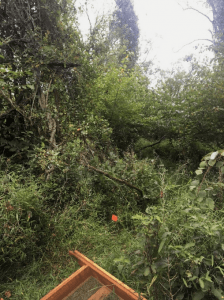In beginning of the Fall 2019 semester, we ventured into the Maryland forest (which felt like a jungle to most), with the guidance of Professor, Dr. Adam Fracchia, for the Northampton Furnace Archaeology Project (ANTH 424). The purpose of the fieldwork is to gain a greater understanding of those who labored the furnace including slaves, indentured servants, and convicts. Throughout the semester, we will learn the fundamentals of an archaeological field survey, excavation methods including site and unit documentation, analysis, and will present our findings at the Hampton Historical Site on December 7th.
The “Maryland Jungle”: the site of the Northampton Furnace Archaeology Project
Colonel Charles Ridgley erected the Northampton Furnace on his property around 1760. The furnace produced pig iron, bar iron, and castings such as stoves and hollowwares. The furnace supplied kettles, round shot ranging from 2 to 18 pounds, and guns and cannons of various sizes to the patriot cause in the American Revolution. By 1827, the Northampton Ironworks was no longer operating, and the land became part of a farm up until its partial inundation by the creation of Loch Raven Reservoir. Much of the evidence of the furnace’s operation has disappeared above the ground surface. Even the furnace stack is now largely under water in the reservoir owned and maintained by the City of Baltimore.

